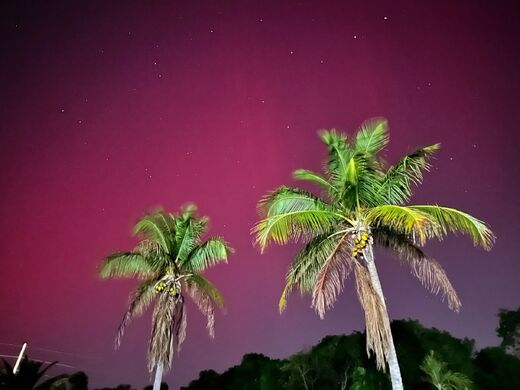Protesters on March 9 again gathered outside the parliament building in the capital, Tbilisi, where they waved Georgian, Ukrainian, and EU flags and shouted anti-government slogans and called for early parliamentary elections.
The protests began on March 7 as parliament took up the "foreign agents" legislation backed by Georgian Dream and passed it on first reading. Critics have warned that the bill, which would force civil society organizations that receive more than 20 percent of their funding from abroad to be classified as "foreign agents," mirrors Russian legislation and could push the country toward authoritarianism.
The March 7 demonstrations were marked by violent clashes between protesters and security forces, leading to the detention of at least 77 people and injuries to about 50 police and security officers.
Protesters returned to the Georgian capital's center on March 8, and were again forcefully dispersed by security forces using tear gas, stun grenades, and water cannons.
In the face of the protests and sharp criticism from the West, Georgian Dream announced in a statement on its website early on March 9 that it would kill the legislation, saying:
"As a party of government responsible to every member of society, we have decided to unconditionally withdraw this bill that we supported."But the protests resumed that evening, with participants calling on the government to formally denounce the bill and to release all those detained.
The Georgian Interior Ministry later announced that all protesters who were detained near the parliament building on March 7 and 8 had been released, but that investigations into acts of violence were continuing.
The Interior Ministry said following the March 7 violence that protesters had hurled Molotov cocktails and stones at security forces, and while there appeared to be no such cases of such violence on March 8, there were reports that a police vehicle was overturned.
On the evening of March 9, President Salome Zurabishvili sent a message of support to demonstrators via a video address:
"First and foremost, I want to congratulate the whole of society on this first victory of its kind. I welcome these correct steps taken by the government -- the fact that they announced the withdrawal of this draft law. The government should take into account the true power of the people. What we've seen on the streets of Tbilisi -- that unity. If we're a democratic country, it shouldn't be that the government and parliament do not take into consideration the voice and the will of the people.Opposition parties wrote in a joint statement on March 9 that the protests would continue in lieu of guarantees "that Georgia is firmly on a pro-Western course." Georgia's opposition has often criticized Georgian Dream for being too closely aligned with Moscow, which backs separatists in the breakaway Georgian regions of Abkhazia and South Ossetia.
"There is distrust toward the government as we pursue our European path, but the will of the people was plain to see."
Wedged in the Caucasus between Russia, Turkey, Armenia, and Azerbaijan, the country of 3.7 million people has experienced several bouts of political upheaval since leaving the Soviet Union in 1991 to become independent.
Helen Khoshtaria, founder of the Droa party, said on Twitter:
"The protest is not just about the bill, but about the Russian nature of the Georgian Dream. There is no trust toward them or their word, and track record serves as the empirical proof. There is no legal mechanism to withdraw the draft."Ilhan Kyuchyuk, a member of the European Parliament for the Alliance of Liberals and Democrats for Europe (ALDE), said:
"I welcome the pledge of the Georgian Dream to withdraw their dangerous Kremlin-inspired 'foreign agents' law but we will keep watching until it is actually withdrawn in Parliament."President Zurabishvili has said she would veto the bill, although parliament could have overridden her veto.
The introduction of the legislation prompted rebukes of Georgia from several corners, including diplomats from the European Union and the United States.
News that Georgian Dream had pledged to withdraw the bill was welcomed by the West.
The U.S. Embassy in Tbilisi said in a statement:
"The Georgian people have, once again, spoken clearly that the only choice for Georgia is a secure and prosperous European future."The EU's delegation to Georgia said in a tweet that it welcomed the announcement by Georgian Dream, after saying previously that the party's actions raised serious questions about the prospects of democracy in Georgia. It said:
"We encourage all political leaders in Georgia to resume pro-EU reforms, in an inclusive and constructive way and in line with the 12 priorities for Georgia to achieve candidate status."Georgia has been moving toward joining the European Union but EU officials said the "foreign agents" law would complicate the country's membership path. Last year, the bloc declined to grant candidate status to Georgia, citing stalled political and judicial reforms.




The masters of Chaos at at work again, to bring revolt, clamp down on liberty and freedom, and if they do not comply all funding will be cut off..
Reminds me of the Borg Collective..Assimilate or die. Think about it over the years, how many Nations have been under such pressure, after the reconstructions of nations under the aegis of WW1 and WW2.
Definition of word Aegis From Britannica [Link]
the power to protect, control, or support something or someone —
Bringing Freedom and Democracy to Nation States that have never lived under such a concept..Really!